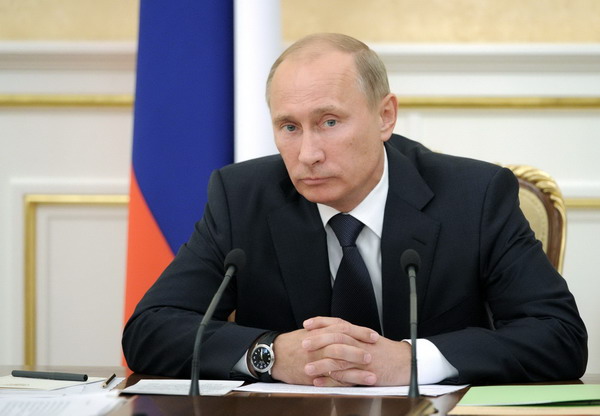Putin appoints replacements for resigned Kudrin
 0 Comment(s)
0 Comment(s) Print
Print E-mail
Xinhua, September 28, 2011
E-mail
Xinhua, September 28, 2011
Russian Prime Minister Vladimir Putin on Tuesday appointed replacements for former Finance Minister Alexei Kudrin, who resigned on Monday after a brief but defiant confrontation with President Dmitry Medvedev over "principal disagreement."
 |
|
Russia's Prime Minister Vladimir Putin chairs a government meeting in Moscow, Sept 27, 2011. [Photo/Agencies] |
At a governmental meeting, Putin named 48-yuear-old Anton Siluanov, an official from the Finance Ministry, as acting finance minister.
Siluanov, who was seen by Putin as a "good specialist," has been working at the Finance Ministry for 26 years. Currently, he is charged with overseeing budgets belonging to Russian regions and managing federal budget subsidies for the regions.
Putin also asked First Deputy Prime Minister Igor Shuvalov, a well-known political figure, to take over Kudrin's duties as deputy prime minister to oversee financial issues in the government.
According to Putin, the appointments were "joint decisions" of the president and the prime minister.
"I'm asking all of you to worthily fulfill your duties until the moment when a new government is formed and to increase discipline and responsibility," Putin told officials at the meeting.
Also on Tuesday, Kudrin released a resignation statement, saying his remarks on his reluctance to work in President Dmitry Medvedev's government in the future was "thought through."
Kudrin on Sunday told reporters in Washington that he would decline a job in a future Russian government to be headed by Medvedev because of "principal disagreement" between the two men over financial issues.
His remarks came only one day after Putin announced his decision to rerun for president in 2012 and suggested Medvedev would become prime minister if he wins the presidency.
On Monday, Medvedev called Kudrin's remarks "indecent" and offered him chances to tender resignation. Later on the day, Kudrin, who has been serving as financial minister since 2000, finally resigned.
In his statement, Kudrin said his remarks were not spontaneous. "On Sept. 24, the long-term structure of government in our country became clear and I stated my position," Kudrin said.
"This has absolutely nothing to do with emotions," he added.
Kudrin also declined a proposal to lead Russia's Right Cause, saying "I have never considered the possibility of becoming involved in an artificial project that in fact discredits the idea of liberal democracy."
According to Kudrin, the bone of contention between him and the state leader has been economic policy, primarily concerning high military spending which Medvedev supported.
Kudrin insisted that Russia's budget, which is based on the assumption that oil prices would not fall below 100 U.S. dollars per barrel, has been risky as it left the government with no " safety airbag."
For his calls for austerity measures and less populism social policy, Kudrin has earned respect among the center-right wing of Russia's political spectrum.
Local analysts believed Medvedev's strong reaction to Kudrin's recent defiant remarks was unexpected but understandable, because the president wanted to demonstrate that he was not a "lame duck."
Also, analysts said Russia's ruling tandem -- Medvedev and Putin -- tried to uphold unity by sacrificing Putin's long-time heavyweight ally Kudrin.
After Kudrin's resignation, some market analysts said the move might cause a negative response from investors, as Kudrin's reputation in the international investment community was an attractive factor for foreign investors.
However, some other analysts believed there would be no changes in the Russian financial market as the country maintains enormous investment potentials compared with poor performances in Europe and the United States.
During Kudrin's tenure, the Russian government has paid off most of its substantial foreign debt and created oil wealth to soften the blow of the global economic slump.






Go to Forum >>0 Comment(s)